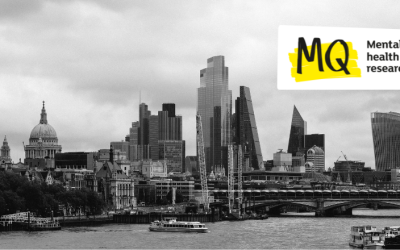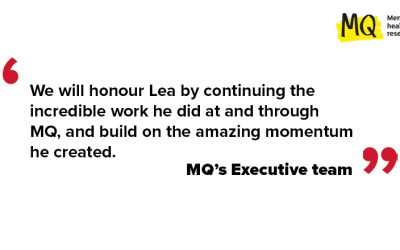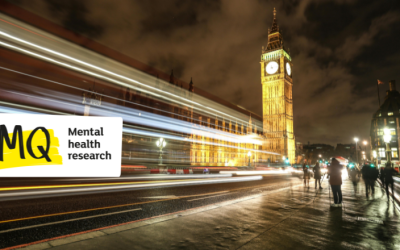This Eating Disorders Awareness Week, MQ’s copywriter Juliette Burton who also works as a writer, comedian, and mental health activist, shares her experience of what happened the day she was sectioned under the mental health act for anorexia.
When I was 17 it was decided I was “insane”. So, I spent my 18th birthday sectioned under the mental health act in hospital. But then, my best friend spent her 18th birthday drunk under a table in Wetherspoons. I think I had the better venue.
The day I was sectioned, 5 August 2002, I was escorted by my parents to our local GP. This wasn’t unusual, I’d been seeing the GP for a few months now. Every week I’d visit my very nice, very handsome local doctor to have my bloods taken, my blood pressure and heart rate measured and have a very nice chat about my condition. It remains one of the most stable relationships I’ve ever had.
However, walking into the doctor’s office that day, I realised something was different. There were subtle clues that something was up; it was a different room to my normal visits, my handsome doctor looked much more serious than usual, and he seemed to have a gathered a crowd for some sort of party to celebrate the seriousness of the situation although his guest list was a bit limited. The other people he’d invited to the soiree were 2 other very serious adults I’d never met before and my own parents. Had there been balloons and party streamers the whole experience might have been more enjoyable for everyone involved, although holding off on cake was a good idea, given the circumstances.
The handsome GP calmly asked me to sit down and calmly told me I was about to be “sectioned under the mental health act”.
I thought. I know what all six of those words mean… separately. But he’s saying them in this fascinating new phrase. I’d no idea what this particular “section” was, not a clue what ‘being’ it meant and about 3 years ago I’d been introduced to the concept of “mental health” – I just thought this was a made up thing overly dramatic people like me talked about.
“You will be taken to a psychiatric facility, and you must go. You have no choice in the matter.” One of the strangers sternly stated.
My mother looked at me with sad but gentle eyes.
I nodded. Not having a choice in the matter. Okay, yep, I can do that. I mean, I’m a teenage girl. It’s not like I’ve had a huge amount of autonomy so far. I can cope with this.
“An ambulance will arrive later today,” my handsome doctor gently explained, “to take you to hospital.”
So, the men in white coats are coming to get me, I reflected. I’m going back to yet another hospital. This summer my friends are awaiting their AS Level results and I’m going on a little trip.
“Juliette…” Dr Handsome looked soulfully at me, “you are a month away from dying.” He paused looking for signs of shock, impact or recognition. His efforts unsatisfied, he went on, “…you’re a month away from dying of anorexia.”
The earnest way he was explaining the fact I was a month away from dying of anorexia seemed to indicate he thought I didn’t know. He was crazy to think I’d be surprised. When he said, “you’re a month away from dying of anorexia.” I thought, yep – sounds about right. I thought. That is kind of the point. My plan is working out just as I’d hoped.
Anorexia was the solution to all the insanity in the world, society, my life. Anorexia solved every distressing thought, every distressing emotion, it was my identity. My life experiences up to this point, the outward societal messages, the internal pain all fed into (pun intended) this illness manifesting to help me cope. It was serving me. Anorexia, to my very ill mind, was the perfect answer to all my problems – high achiever with low self-esteem, being a perfectionist in an imperfect world, being scared of failing, feeling my life was out of control, the imploding pressure of being young, the claustrophobic pressure of being a woman, the terrifying momentum of puberty and adulthood marching towards me, my voice not being heard or listened to… feeling powerless against all of that and so much more. Anorexia gave me power. My resistance to eating was my resistance. Anorexia solved all of my inner turmoil and numbed everything. Why would I want to stop?
And now here was this doctor giving me this supposed great revelation I was already aware of. Why are you getting paid so much money, I thought, to tell me something I not only already know but I’m doing deliberately? And I’m the certifiable one?
“I have been trying” I said, in a half-truth.
“And that’s great,” Soulful-eyes enthused. “But it’s not making a difference fast enough.” A complaint I’ve subsequently made of meditation tapes, therapy, teeth whitening toothpastes and anti-wrinkle facial moisturisers.
That minx of a mind monster had been festering in my mind for about decade and only was noticed due to years of hiding starvation tactics, cutting back calories, over-exercising, years and years of hints and tips – none of which I’ll explain in any of my writing. I don’t want to give anorexia the pen.
Anorexia was the first of my mental illnesses to be properly diagnosed and properly noticed and properly treated. Underlying that illness were other mental health conditions I’d not yet learned how to manage. Anorexia was the condition I was sectioned for; it was the condition that caused the most alarming symptoms to other people. But it wasn’t the condition I’d lived with for the longest.
I’d spent years struggling with my mental wellbeing, anxiety disorder, depression, bipolar disorder, separation anxiety disorder, complex post-traumatic stress disorder, body dysmorphic disorder, compulsive overeating disorder, obsessive compulsive disorder. They just hadn’t been properly treated, diagnosed or discussed just yet.
Later that night, my mum and I were in the kitchen, waiting for the ambulance. With so little body fat, the warmest room in the house, was the logical place to wait.
Now I know the classic image people imagine of a certifiable lunatic being sectioned or detained or committed would be some crazed half-human, frothing at the mouth, kicking, and screaming, resisting the efforts of men in white coats. But in fact, I remember just being led by the paramedic into the back of the ambulance without resisting at all. Like a horse going to the knackers’ yard being led by the reigns into the horsebox, head down, one foot in front of the other, knowing my place. As strong as I felt, even I knew if I put up a fight I’d lose. The two paramedics flanking me were nothing compared to my mother by my side. I always do what I’m told if my mother is around.
After getting into the ambulance, I was taken to the psychiatric hospital and remained there for 3 months. I was then given my human right to freedom back, no longer sectioned legally and was permitted to leave. The treatment during this time led to me experiencing psychotic hallucinations due to stress and some of the most difficult experiences of my life. But my life was saved and I’m so pleased, now, that it was. The experience on the inside of this hospital, like others I’ve experienced being an inpatient within, wasn’t easy but I am still grateful to those who saved my life meaning I could share my story and hopefully add to the effort to ensure others in the future do not experience what I have. This is only possible with research.
Eating disorders are mental illnesses and sometimes, but not always have physical symptoms. My physical symptoms at this stage of my life meant medical professionals intervened to ensure I did not die from those symptoms. While others might experience eating disorders, they might not experience physical symptoms at all, yet their pain and distress in their eating disorder is important to take seriously – the measurement of distress has nothing to do with the physical symptoms. No matter the eating disorder manifestation, compassion is key. In my experience pain is pain, no good comes from quantifying or comparing, judging, or measuring.
At this time in my life, I was a teenage girl but my relationship with food has been problematic throughout my life at every age since I was very young. Eating disorders can affect anyone of any age, gender, race, sexual orientation, or background. While food and I still have a complicated relationship, my relationship with food has improved, grown and I still believe recovery is possible for anyone.
My ongoing journey of recovery has been a changeable one, food still teaches me a lot about how I am psychologically speaking. And how I feel around it and about it continues to give me the deeper insight into parts of myself I couldn’t access when I was sectioned. While eating disorders are life threatening and the mental illness that has affected my life arguably the most, navigating my recovery with it has taught me so much, particularly around compassion.
If you’re worried about your own or someone else’s relationship with food, you can contact Beat, the UK’s eating disorder charity, on 0808 801 0677 or beateatingdisorders.org.uk



